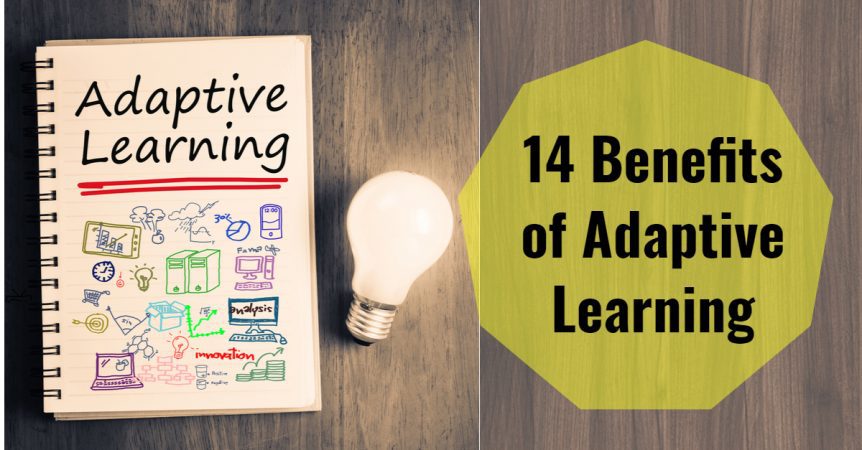14 Benefits of Adaptive Learning
Adaptive learning involves implementing a personalised e-learning model. This enables learners to focus on areas where they need to improve their skills or knowledge, while skipping content areas where they are already strong.
There are several different approaches to delivering adaptive learning content. You can give learners a pre-training assessment, for example, with the results of that assessment determining what content they see in the course. It can also be as simple as asking learners to choose a role that best represents them, or you can create a library of e-learning courses on focused topic areas that learners can complete when they need to.
What are the benefits of adaptive learning, though? Here are the 14 main advantages.
-
Training Has More Purpose
Learners will have a greater sense of purpose when completing the training as it won’t feel like they are just going through the motions. Instead, they can concentrate on learning those topics and skills areas where improvements can be made.
-
Directly Addresses the Needs of Learners
Employees benefit from this highly targeted method of training, but your organisation will benefit too. The main advantage is that adaptive learning addresses the specific needs of individual learners, helping to raise standards overall.
-
Learners Feel More Empowered
Adaptive learning gives learners more control over the training experience, helping them feel empowered by the process. They will also feel the organisation values their time and respects the fact they already have good levels of knowledge in certain areas, i.e., just because some learners require training on certain topics doesn’t mean everyone has to go through the training.
-
Increases the Confidence of Learners
Adaptive learning increases the confidence of learners as it shows them what they know and what they don’t know. Furthermore, the content itself gives learners an opportunity to acquire the knowledge or skills that are lacking. Therefore, not only does adaptive learning increase confidence in the training process, but it can also increase confidence in the learner’s day-to-day activities.
-
Learners Progress Through Courses Faster
Learners being able to skip content they are already familiar with will help to speed up progression through the course. There is also the fact that learners will be more engaged and enthusiastic with the process, so it won’t feel like a slog to get through.
-
Learners Spend Less Time Off the Job
This point follows on from the previous one, i.e., if learners get through the e-learning content faster, they will spend less time away from their main job. They will also be able to put to use their new skills or knowledge more quickly.
-
Establishes Knowledge Gaps
Knowledge gaps exist in all organisations. One of the challenges is identifying them, but adaptive learning helps with this process. In fact, the main concept behind adaptive learning is that training is only focused on knowledge gaps, so identifying them is a core part of the strategy.
-
Learners Receive Real-Time Feedback
In standard linear training courses, learners progress through content without really knowing how well they are doing. Adaptive learning gives you opportunities to add real-time feedback loops, including those that alter the training path the learner is taking, e.g., by providing additional training content where necessary.
-
Improves Learner Motivation
The motivation of learners can increase with adaptive learning, not least because they are able to spend all their time during the training on content that is of value to them.
-
Enhances Learner Engagement
Engagement levels will also increase for the same reasons as the point above. This advantage of adaptive learning is particularly important as engagement is crucial for successful e-learning courses. The more you can get learners to engage, the easier it will be to achieve your training objectives.
-
Makes it Easier to Produce E-Learning Content for Diverse Groups
One of the main challenges when creating e-learning content for a diverse group of people is making it relevant. This applies whether the diversity is because of location (with some individuals in the UAE and others in Saudi Arabia, for example), job role, or any other reason. Adaptive learning minimises the challenges and, depending on your priorities, can even eliminate them.
-
Learners Get a Better Understanding of the Topic
When learners can focus all their time, concentration, and effort on areas where they need to improve, their overall level of understanding will increase.
-
Better Outcomes for the Business
The business will achieve better outcomes from the training, too, because it will be more successful. In training, success can be measured by both knowledge retention and changed behaviour, i.e., the learner putting the skills or knowledge they have learned to active use. Adaptive learning helps with both.
-
Improves Independent Learning Skills
Businesses in many industries require learners to continuously improve their skills and knowledge. This particularly applies to technology given the rapid pace of development. Therefore, independent learning skills are becoming increasingly valued. Adaptive learning helps your team develop and improve these skills.
Delivering a Return for Your Business
Adaptive learning is not always the best option for training topics, but it can bring considerable advantages to those subject areas where it is suitable. As always, the central principle is important to remember – optimising the learner experience to achieve the best outcomes and return on investment for the business.
